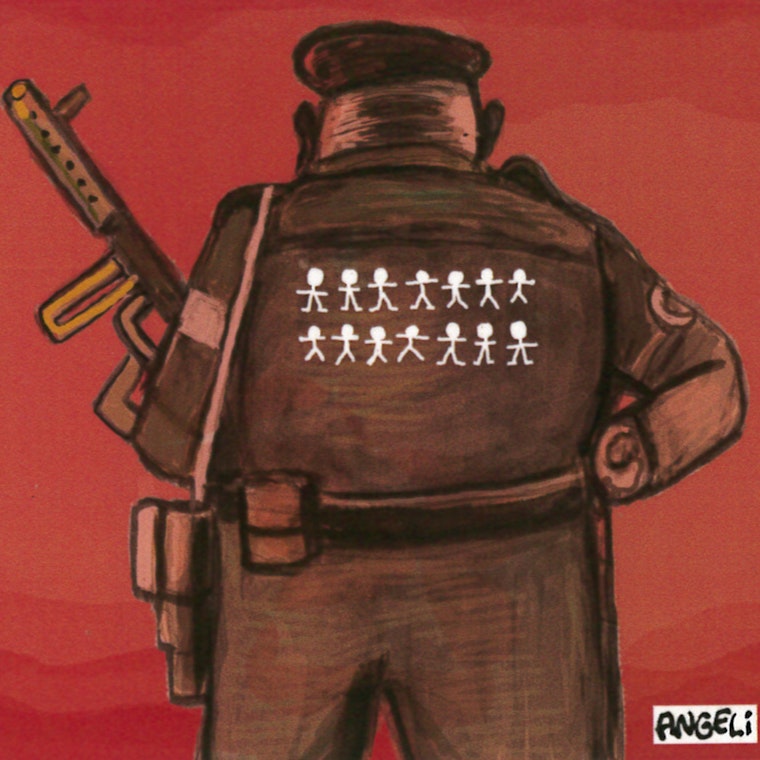An Anti–Drug War Ad Campaign Vanishes in Brazil
By Catesby Holmes

In Latin America, the continent that has suffered the brunt of the U.S.-led war on drugs, an emerging international reform movement contends that prohibition has failed to create safe, just, and healthy communities. As a recent New York Times article highlighted, governments across the region—in particular Mexico, Colombia, Guatemala, and Uruguay—have begun to push back against U.S. policies like aerial eradication of coca and militarized repression of illicit substances.
However, in Brazil, the regional hegemon, a hardline approach to drug dealers, users, and producers retains widespread popular and political support. Reform advocates there argue that prohibition has caused the country the kind of social, economic, health, and governance harms seen elsewhere in the region. Yet “lock ’em up and throw away the key” continues to be the favored policy.
So one Rio de Janeiro organization, the Center for Studies on Public Security and Citizenship (CESeC), is trying a new approach to educate people about the drug war’s failures: public art.
In late April, CESeC launched an ambitious antiprohibition ad campaign. Da Proibição Nasce o Tráfico (“Trafficking Is Born of Prohibition”) consists of five comic book-style public service announcements placed on 40 city buses. Drawn by some of Brazil’s best-known artists, the cartoons concisely depict the irrational nature of the drug war in a frank yet easily digestible way.
One shows a tally of dead children drawn on the back of a heavily armed officer from Rio de Janeiro’s SWAT-style drug police, suggesting that more people die from drug-law enforcement than from drug use; another, playing on a Brazilian saying that refers to an impossible and interminable task, submits that ridding the world of drugs is like “trying to dry ice.”
The creative campaign, which ran for 30 days, received ample media attention and a mix of supportive and perplexed responses from bus riders in Rio. Though one bus driver commented to a local blog [Portuguese] that “legalization will increase crime, it isn’t going to fix anything,” there was, perhaps surprisingly, no political pushback.
But things played out differently in São Paulo.
Two days after the campaign’s April 27 launch in São Paulo, one of the world’s biggest cities, the state ordered the ads pulled from the buses. CESeC was given no warning of or reason for the decision. Repeated media inquiries to the state transportation authority, bus company, and governor’s office have gone unanswered.
“All we know is that the owner of the marketing company that sold us the ad space on the buses received a phone call ordering him to remove the cartoons on the grounds that they constitute ‘an apologia for drugs,’” says Julita Lemgruber, CESeC’s director. “Apparently, not just drugs, but even talking about drugs is illegal in São Paulo.”
Rather than glorify or defend drug consumption, Lemgruber says, the campaign seeks to “use the special power of cartoons to synthesize and present hard-to-accept information and challenge common sense, which is that the drug war has caused far more harm than the substances themselves ever could.”
Statistics support that claim. Brazil’s militarized police force is one of the world’s most lethal. According to a 2014 study by the Brazilian Forum on Public Safety, in the last five years, police killed 11,000 people—a disproportionate number of them young black men.
In a story all too familiar in Colombia and Mexico, criminal drug trafficking organizations control Brazil’s favelas and some political offices. Mass incarceration has overcrowded prisons and increased stigmatization of already-marginalized poor communities.
If all this sounds familiar to those in the United States, it should, says Lemgruber. “We have followed the U.S.-led, internationally enforced war-on-drugs model, and this is where it’s gotten us.”
In a June 1 op-ed [Portuguese] in São Paulo’s Folha newspaper, Lemgruber argued that the timing of the government’s move seems significant. On May 28, the same day the cartoons were taken down, a new organization, the Brazilian Platform for Drug Policy, was holding its launch event in São Paulo. This association of Brazilian organizations and notable individuals—including lawyers, doctors, activists, patients, journalists, politicians, teachers, students, growers, and consumers—was founded to raise public awareness of the harmful impacts of current drug policies and propose alternate approaches. This was also the goal of CESeC’s cartoon campaign, says Lemgruber, who is on the advisory board of the Brazilian Platform.
Pedro Abramovay, regional director for Latin America and the Caribbean for the Open Society Foundations, who is based in Brazil, points out the ironic outcome of the government’s actions. “The campaign got attention in Rio, but nothing compared to what we’re seeing now in São Paulo in terms of media coverage and public debate. Everyone in the city is talking about these cartoons.”
Increased attention is not the only unintended consequence of banning the cartoon ads. Lemgruber is working on a lawsuit against the São Paulo state government for violating the organization’s constitutionally guaranteed freedom of speech and expression.
The Center for Studies on Public Security and Citizenship is a grantee of the Open Society Foundations.
Until September 2016, Catesby Holmes was a senior program coordinator for the Open Society Latin America Program.

